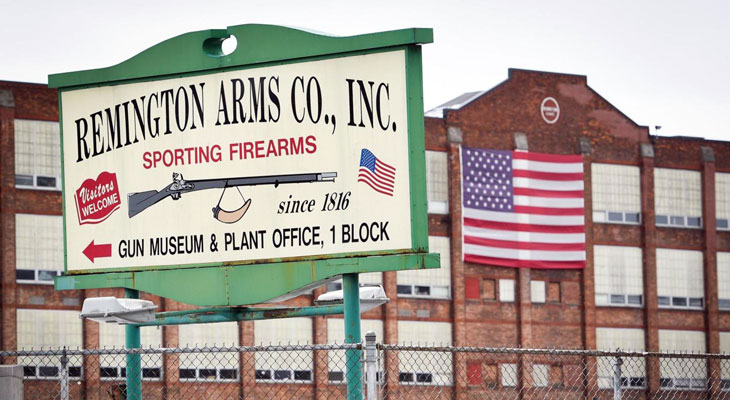Column By Mike Bibb
Two hundred and eight years of history. Gone, gone. Ilion is Remington. Remington is Ilion. The history and the nostalgic loss that we’re going to suffer is almost, if not bigger, than the financial loss.
John P. Stephens, Ilion City Mayor – New York Times, Feb. 18, 2024
As a sign of the times, New York’s economy, taxation, government policies, and collapsing social environment are forcing many businesses to exit the Empire State in favor of resettling in more hospitable conditions.
Similar to scenarios playing out in equally Blue California and Illinois. The cost of doing business in these states is costing too much. As a result, states like Arizona, Florida, South Dakota, Tennessee, Texas, and others are witnessing an influx of businesses and residents seeking a less expensive and regulatory lifestyle.
Unfortunately, Ilion, NY is experiencing the reality of its own state government’s rules and regulations smothering the incentives of private industry.
Particularly, coming on the heels of COVID’s spectacularly stupid mandates, which nearly crippled New York’s economy.
Being a firearms manufacturer is an especially daunting endeavor. Federal, state, and local laws, coupled with constant legislative pushes for additional gun controls, make producing and selling their product considerably more arduous than most businesses. Often, costly litigation is another expense to contend with.
When all is said and done – unless necessary – why would any private company continue to remain in a state that increasingly makes it difficult for them to do business?
Remington’s early history began in a blacksmith’s shop. Eliphalet Remington, Jr. began his career working in his dad’s forge in Litchfield, NY in 1816. He made only rifle barrels at the time. Later, he moved his production facilities to Ilion in 1826.
It wasn’t until the late 1840s and early 1850s that Remington began producing complete rifles, mostly military style for the government. A few revolvers were also made.
Leadup to the Civil War, and during the conflict, greatly increased Remington’s fortunes and manufacturing capabilities.
Their innovations in rifles and shotguns, with modern mass production capabilities, propelled Remington into being a major player in the small arms and ammunition business in New York and the nation.
Remington was also an important supplier of firearms in World Wars I and II. However, the sun didn’t always shine over Remington’s brand. Increased competition, mismanagement, government regulations, and rising indebtedness forced the parent company, Remington Outdoor, into bankruptcy in 2020.
A new company, RemArms, was formed. To cut production costs and withdraw from New York’s excessive taxation and regulatory requirements, the decision was made to abandon the old Ilion, NY complex and move the entire operation to LaGrange, Georgia. – “Remington’s Ilion Factory Closes,” American Rifleman, March 2024.
Approximately 800 employees will be working at the new $100 million factory.
Needless to say, Remington’s move upset a few folks.
U.S. Rep. Elise Stefanik’s (R-NY) district including Ilion, posted “It is because of New York Democrats’ unconstitutional gun grab policies that the oldest gun manufacturer in the country has been run out of the state. I have spoken with local officials and Remington Arms union members in United Mine Workers of America, Local 717, about how we must stand up to New York’s failed unconstitutional gun bans. [Gov.] Hochul must stop her unconstitutional assault on the Second Amendment now.”
Remington’s chief executive, Ken D’Arcy, commented in a press release, “We are deeply saddened by the closing of this historic facility. But maintaining and operating those very old buildings is cost-prohibitive. And New York State’s legislative environment remains a major concern for our industry.”
His key words “legislative environment,” should be heeded by all rational thinking politicians.
When conducting business becomes excessively expensive and regulatory influenced, businesses will instinctively seek ways to reduce costs and government overreach. Sometimes, this may require moving the company to a different location where the burdens are not as oppressive.
We’ve seen other large corporations relocate for basically the same reasons. The very nature of most for-profit businesses is to earn a profit or gain for the company and investors from its products or services, or it can’t stay in business.
The imposition of excessive government rules, regulations, taxes, and fines eventually adds to the costs of the item, which is passed on to the consumer.
Price increases and inflation amplify the difficulties.
When those costs become prohibitively excessive, even for the consumer to accept, measures must be taken to remedy the problems, or the business could be in jeopardy of failure.
Simple Econ 101.
Unfortunately, many government legislators and employees have no idea what operating a business involves. They haven’t signed a payroll check, negotiated a labor agreement, conducted an inventory accounting, complied with state and federal tax requirements and mandates, dealt with lawsuits, or have to live with the consequences of these dictates.
Public interest decline in the electric vehicle fad is an example. Despite factory and government-sponsored financial incentives, the vehicles are not selling in large enough numbers to maintain current production rates. Only about 7% of domestic 2023 auto sales were EVs.
Realizing Biden’s goal of achieving a 67% electric vehicle market by 2032 is not attainable without wrecking the entire industry. This is partially due to the fact EV cars, trucks, and SUVs are expensive and an adequate infrastructure of charging stations to maintain them is not conveniently available.
Ford’s CEO discovered this dilemma when he cruised down I-5 in California in a new electric Lightning pickup and made the startling discovery there were hardly any charging stations around to recharge the batteries.
A horseless carriage in search of a horse. Why it took the company’s chief executive officer to finally figure out more EVs were being produced than the public’s capacity to recharge them, is beyond me.
Consequently, Ford soon began slowing EV production at its assembly plants by reducing volume and cutting shifts. Other electric vehicle manufacturers have done the same.
When a company’s bottom line begins to feel pain, attentive management will eventually impose measures to help alleviate the discomfort.
For example, The Left’s “Green New Deal” is stumbling from a lack of basic knowledge of economics and practical judgment; there simply isn’t sufficient belief that “electric everything” – via renewable energy – is the way to go. No matter how fiercely government officials and impetuous environmentalists promote it.
To assist in mitigating operational costs, Remington Arms chose another option – they pulled up stakes and moved to Georgia to preserve the company.
Fellow firearms maker, Smith & Wesson, made a similar move from its plant in Springfield, Mass. to Maryville, Tenn. in October 2023.
So, while one area of the country is negatively impacted by excessive government involvement, another area is positively affected by less government involvement.
It shouldn’t be difficult to figure out, but apparently, it is. Hard facts nearly always overwhelm pie-in-the-sky ideologies.
Even for folks with a prestigious Harvard, Yale, or Columbia business degree. Just because professors and school administrators presiding over these influential Ivy League universities are touted as being among the best around, does not necessarily indicate they are endowed with an overabundance of intellect and common sense.
The opinions expressed in this editorial are those of the author.








